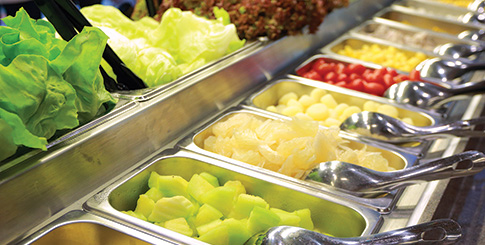“Organic is important, but only to a customer/operator with organic recipes or menu items,” notes Hilowitz. “Restaurant patrons don’t have visibility to what is being used to prepare their meal.”
For those institutions and restaurants that have built their reputation on locally sourced or organic items, there is a much firmer commitment. Brian Kane, chief operations officer of PRO*ACT, LLC in Monterey, CA, adds, “Organics have traditionally been the purview of the retail and wholesale industry, but we’re seeing a slight uptick in foodservice demand.”
The role of organics is always a hot button issue and some industry professionals as well as consumers see the choice as a matter of elitism, considering the higher cost. Jill Overdorf, director of business and culinary development for Coosemans LA Shipping, comments, “I know it’s a controversial statement, but the label of ‘certified organic’ indicates a growing process, not necessarily a more flavorful or healthier item. It’s an opportunity to ingest fewer ‘bad’ chemicals into one’s gastrointestinal system, and ideally, I’d like to see organics and conventional produce cost the same so the choice is more egalitarian.”
Packaging Options
When it comes to packaging—size, weight, and materials are of utmost importance. “Foodservice customers look for customization,” notes Hilowitz, “in addition to ease of use with minimal waste. With bulk products, it’s a selling advantage to use recyclable and eco-friendly packaging to promote sustainability.”
As far as reducing packaging waste, Ramsey agrees most suppliers are doing their part to minimize carbon footprints. “This is a priority for us—at our facilities, 90 percent of our wash water is reclaimed into industrial waste systems for use on golf courses and city landscaping. And the corrugated [containers] we use are both recycled and recyclable. One way we reduced the use of plastic in a party tray was by eliminating the lid and just using a film liner.”
Victory Packaging, now owned by KapStone Paper and Packaging Corporation, is located in Houston, TX. Cheryl Wilson, vice president for perishable packaging, points out, “It’s very important for customers to be able to recycle their packaging. We provide trays, film, bags, and specialty products such as PET [polyethylene terephthalate plastic] jars. The single layer polypropylene trays are the most recyclable; salad bar items like tomatoes, full size onions, and lettuce are in these trays.
“We’re also seeing more demand for customized packaging,” Wilson adds, “including combination packs of Mexican or Italian items for salad bars. Looking to the future, there’ll be more packaging that improves shelf life. However, so much of the acceptance of innovation comes down to price: you can come up with the greatest idea ever, but cost is a central issue.”



